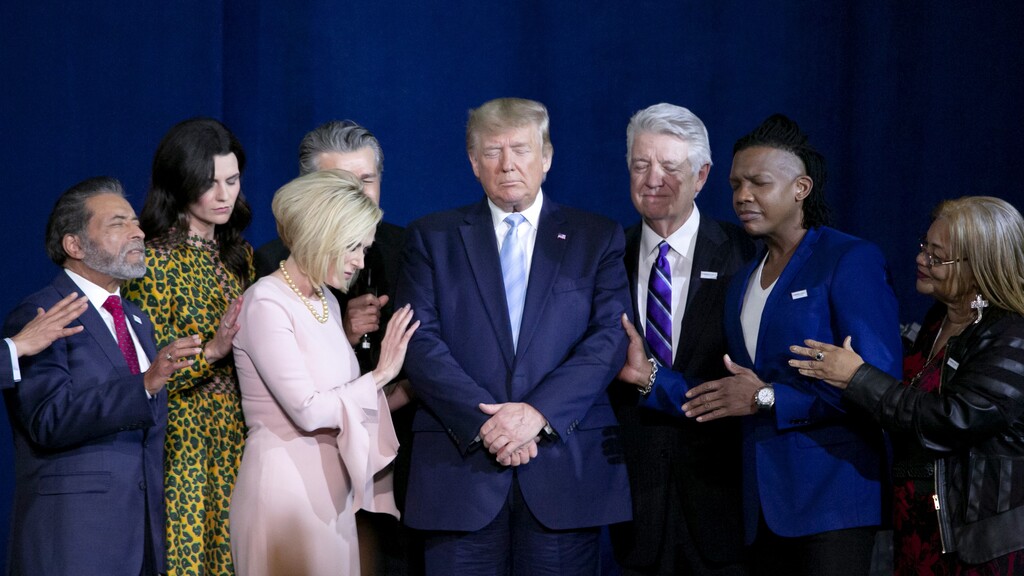Getting your Trinity Audio player ready...
A new survey conducted by the University of North Carolina (UNC) at Pembroke shows a sharp drop in support for Israel among young evangelical Christians in the United States.
The study shows a growing gap between the older and younger generations of the community, but some close to the community say the poll does not necessarily reflect the reality on the ground.
Conducted in early 2021, the poll’s numbers show a shift in how the younger generation views the Israel-Palestinian conflict and in their support for Israel compared to the last study, conducted in 2018.
In 2018, the rate of support for Israel among young evangelicals was 69%; this support dropped to 33.6% in the latest survey.
“The younger evangelists are less conservative, belonging more to the mainstream of American society,” says Motti Inbari, who conducted the study together with Kirill Bumin at UNC.
“The support for Israel has a direct connection to age. Even in the Democratic Party, support for Israel is mainly among the older population.”
“There is a kind of overreaction to the previous generation’s position on Israel,” says Daniel Darling, senior vice president of communications at the Washington-based National Religious Broadcasters association.
“Perhaps they perceived that generation as giving Israel kind of a blank check in terms of their support.”
Josh Reinstein, president of the Israel Allies Foundation and director of the Knesset Christian Allies Caucus, calls the findings of the poll “misleading.”
“The children of evangelicals are a lot less religious than their parents,” Reinstein says.
“These polls are trying to portray a narrative that doesn’t really exist. What is really happening is that there are just less evangelical Christians.”
Data coming out of the U.S. supports this claim, showing a gradual decline of Christianity in the country, including a shrinking evangelical community.
4 View gallery


American evangelical leader John Hagee, center, heads a pro-Israel march by Christians in Jerusalem
(Photo: AP)
However, the UNC poll shows high rates of young evangelicals attending church at least once a week.
“There is a misconception that evangelical support is because of a political platform; this is not true,” Reinstein says.
“They support Israel because of a biblical perception … based on faith and values … and that does not change when leaderships change.”
In recent years, Israel has become an increasingly contentious issue in the U.S. While Israel once benefited from bipartisan support in the U.S., this has changed.
Identifying the trend, Israel has invested heavily in bolstering support from the American right, with evangelicals at the helm.
Former prime minister Benjamin Netanyahu embraced evangelical support openly throughout his twelve-year term that ended earlier this month.
“Israel has no better friend in America than you,” Netanyahu told a large evangelical audience in 2017, in an apparent shift from American Jewry forming the cornerstone of the Israel lobby in Washington.
4 View gallery


Then-opposition leader Yair Lapid meeting with U.S. Secretary of State Antony Blinken in Jerusalem, May 2021
(Photo: U.S. Embassy in Jerusalem)
Foreign Minister Yair Lapid has already criticized Netanyahu’s policy, which “abandoned Israel’s bipartisan standing.”
In a conversation Tuesday with Speaker of the House of Representatives Nancy Pelosi, Lapid said they “spoke about the importance of the bipartisan nature of the support for Israel in the U.S.”
However, currently led by right-wing Prime Minister Naftali Bennett, the new government is not likely to abandon the evangelical community as a strong base of support within the U.S.
And while evangelical support for Israel appeared to be steadfast, beneath the surface there were already cracks.
Support for the establishment of a Palestinian state rose from 35% among young evangelicals in 2018 to 44.7% today. In an apparent contradiction, 71.6% think that Jerusalem should be Israel’s capital.
“The survey shows a need for education to continue to explain the importance of Israel’s right to exist and to combat media narratives that often portray Israel in a negative light,” says Darling.
“There is a persistent narrative in major media that is very negative about Israel.”
Meanwhile, when young evangelicals were asked how frequently they hear about the importance of supporting Israel, a majority answered seldom to never.
With the departure of former president Donald Trump and the arrival of the new Biden administration, Israel is facing a different set of circumstances and will have to prepare accordingly.
The opinion expressed recently and publicly by former Israeli ambassador to the U.S. Ron Dermer, who said that Israel should adopt a policy prioritizing the support of evangelical Christians, simply may not be relevant anymore.
“Support doesn’t change overnight with the election of Biden,” says Reinstein.
“Within the evangelical base, which is mostly Republican, I don’t think we are seeing any decline in support; in fact, we are seeing more support than ever,” he says.
“The younger generation just doesn’t have the same zeal,” says Dr. Yoav Fromer, director of the Center for the Study of the United States, in partnership with the Fulbright Program, at Tel Aviv University.
“For Israel this could be a game-changer, fragmenting the support base.”
The UNC poll showed that close to half of young evangelicals, or 45.8%, voted for Biden. Only 25.7% voted for Trump and a similar percentage did not vote. These numbers reflect the general trend in the entire population, in which more young people voted for Biden.
“The most important thing that can be done to bolster support for Israel among evangelicals is to clearly communicate the fact of Israel’s right to exist, of the importance of working for peace among Israel and her neighbors, and of understanding that Christians can both support Palestinian Christians and Israel’s right to exist,” says Darling.
But, according to Fromer, that might not help.
“Today, there is less talk about Israel among evangelicals, priorities have changed and Israel is just not at the top,” he says.
In addition to a new administration in the White House, there is also a new government in Israel.
“We will see a lot of cooperation,” says Reinstein. “Christians taking their biblical support and turning it into political action is really the most important weapon that Israel has in its diplomatic arsenal. The current leadership in Israel understands profoundly the importance of faith-based diplomacy.”
The UNC survey was conducted among an online panel of 700 evangelical Christians, ages 18 to 29, from March 22 to April 2. There is a margin of error of ±3.7 percentage points.
Reprinted courtesy of The Media Line



